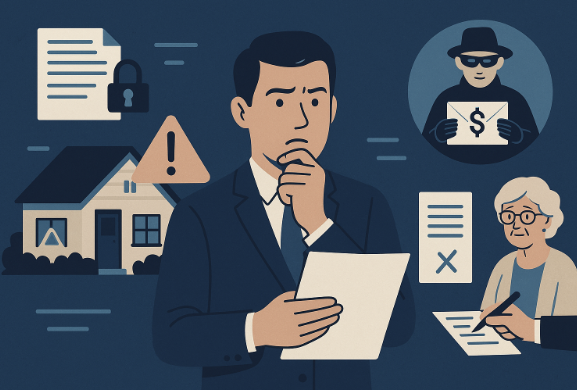California’s real estate market is one of the most active and valuable in the nation—and that makes it a prime target for scammers. From mortgage fraud to deed theft, these crimes can cause serious financial harm to both buyers and homeowners. The California Department of Real Estate (DRE) is urging everyone involved in real estate transactions to stay informed and vigilant.
Many of these crimes take advantage of the complexity of buying or financing a home, and even honest people can get caught up in fraud without realizing it. Here are some of the most common schemes affecting Californians and how to avoid them.
1. Mortgage Fraud
This happens when financial information is falsified to qualify for a loan that wouldn’t normally be approved—such as overstating income or assets. The fallout can include foreclosure and lasting credit damage.
How to protect yourself: Always provide truthful information, read everything before signing, and work only with licensed lenders or agents you’ve verified through DRE records.
2. Business Email Compromise (BEC)
Criminals may hack the emails of real estate professionals or escrow officers to trick buyers into wiring funds to fake accounts.
Protect yourself: Confirm all wire instructions by phone before sending money. Never rely solely on email. Watch for small changes in email addresses or domain names.
3. Deed and Title Fraud
Scammers sometimes forge signatures or file fake documents to transfer ownership of a property.
Protect yourself: Regularly check your property’s title with the county recorder. Enroll in any available deed monitoring alerts, and don’t ignore unexpected paperwork related to your home.
4. Foreclosure Rescue Scams
Fraudsters promise to “save” a home from foreclosure in exchange for upfront fees or ownership transfer—but their goal is to take the property or your money.
Protect yourself: Legitimate housing assistance programs never charge upfront fees. Check that any company is HUD-approved before agreeing to help.
5. Property Flipping Fraud
Dishonest investors may make minimal repairs to a home, falsify appraisals, and resell it at a huge markup.
Protect yourself: Always hire your own inspector and appraiser. Review the property’s permit history through your local building department.
6. Equity Skimming
This occurs when a fraudster convinces a homeowner to sign over the title to “avoid foreclosure,” then collects rent or mortgage payments and never pays the lender.
Protect yourself: Never sign over ownership of your property as part of a rescue plan. Consult an attorney before transferring any rights.
7. Straw Buyer Schemes
A “straw buyer” is used to hide the identity of the real purchaser—often someone unqualified for a loan. The straw buyer ends up responsible for the mortgage and faces legal trouble.
Protect yourself: Never buy a home on someone else’s behalf or misrepresent your finances on loan documents.
8. Mortgage Elimination Scams
Some scammers promise to wipe out your mortgage through loopholes—for a fee. These are always fraudulent.
Protect yourself: No one can legally erase mortgage debt for a fee. Report suspicious offers to the DRE or the Attorney General’s Office.
9. Elder Financial Exploitation
Seniors are frequent targets of real estate fraud, often persuaded to sell or transfer property under false pretenses.
Protect yourself: Involve trusted family members or advisors in financial decisions, and never sign documents you don’t fully understand.
Final Thoughts
California’s high-value housing market attracts both opportunity and risk. The best defense against fraud is education and diligence. Work only with trusted, licensed professionals, verify credentials, and always follow your instincts.
If you suspect you’ve been a victim of a real estate or mortgage scam, report it to the California Department of Real Estate: https://dre.ca.gov/Consumers/FileComplaint.html



